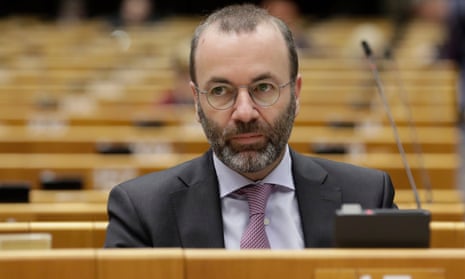A standoff in the Brexit negotiations has been blamed on the factional infighting in Downing Street, as Dominic Cummings confirmed he will leave the government by Christmas.
Manfred Weber, the leader of the largest party in the European parliament and a political ally of the German chancellor, Angela Merkel, lamented the “chaotic situation” at the heart of No 10.
Cummings, Boris Johnson’s most powerful aide and former Vote Leave campaign director, confirmed on Thursday evening after days of speculation he would leave Downing Street.
Weber, an MEP in the German Christian Social Union, a sister party to Merkel’s Christian Democratic Union, told BBC Radio 4’s Today programme there appeared to be a lack of a clear steer from the heart of government at a crucial juncture in the talks.
The Brexit talks are deadlocked over two main issues: future EU access to UK fishing waters and the “level playing field” provisions to ensure neither side can achieve a competitive advantage through lowering regulatory standards or subsidising failing businesses.
Weber said: “There are fair questions we are asking … If you want to change in the future, with your background of sovereignty, your subsidies, regulations, then we must have an option an opportunity to react to stop to limit your access to our market …
“I see what is happening now in Downing Street. We can also see this as a quite chaotic situation where we don’t have an idea what is really the line in Great Britain. So don’t tell us we should be ready for compromise.
“We need a clear idea from Boris Johnson now and I think it’s now time for leadership – having all the developments in America in mind where London understood it will be not so easy with Joe Biden [as US president-elect] to achieve an easy trade deal now.
“It’s time to take over responsibility and come to a common understanding. Britain has red lines, we have red lines, let’s now come to a compromise.”
The claim was immediately rebutted by UK government sources, who pointed out that David Frost, a former British ambassador to Denmark who is now the prime minister’s special adviser, is leading the UK’s negotiating team.
“David and the team are completely focused on the negotiations,” an UK official said. “The prime minister has been clear that he wants a deal if there is a deal to be done. We’ve been negotiating constructively and with creativity.”
The official added: “I guess the reason the EU feel the need to say these sorts of things is that they are starting to realise that we meant it when we said there were fundamental principles from which we couldn’t move. We need to see some realism and creativity from their side if we are to bridge the significant gaps that remain.”
Downing Street has been in chaos following a report that Lee Cain, Johnson’s loyal director for communications and a former Vote Leave ally, had been offered the role of chief of staff. The news was heavily resisted within government and Cain has since resigned.
Cummings, the prime minister’s chief adviser and former Vote Leave campaign director, told the BBC on Thursday night that “rumours of me threatening to resign are invented”. However, he confirmed that he had not changed his plans since writing a January blog in which he wrote that he hoped to make himself “largely redundant” by the end of 2020.
Cummings dismissed as “comical” claims that a dispute over how to manage the final phase of the Brexit negotiation was to blame for the recent crisis in Downing Street.
There have been concerns raised in the past by EU officials and diplomats that the prime minister was being “held captive” by former Vote Leave campaign members.
One senior EU diplomat said Cummings’ planned departure offered hope that the UK government’s resistance to agreement with the EU on a future domestic subsidy regime might slacken.
“His flawed concept of state aid has held the negotiation hostage,” the diplomat said. Cummings has championed the UK’s future ability to subsidise the tech industry as a major Brexit dividend.
However, the recent developments are not viewed by EU officials close to the talks as being hugely significant to the outcome. A deal must be secured within weeks to allow time for parliamentary ratification.
The EU’s chief negotiator, Michel Barnier, tweeted a picture of himself on a London football pitch on Thursday, citing the logjam over standards and subsidies.
He tweeted: “Short break from intense negotiations in London. Went looking for level playing fields … ”
The EU negotiating team will leave London on Friday and re-engage with their UK counterparts on Monday in Brussels. It is hoped significant progress can be made ahead of a summit of EU leaders next Thursday.
